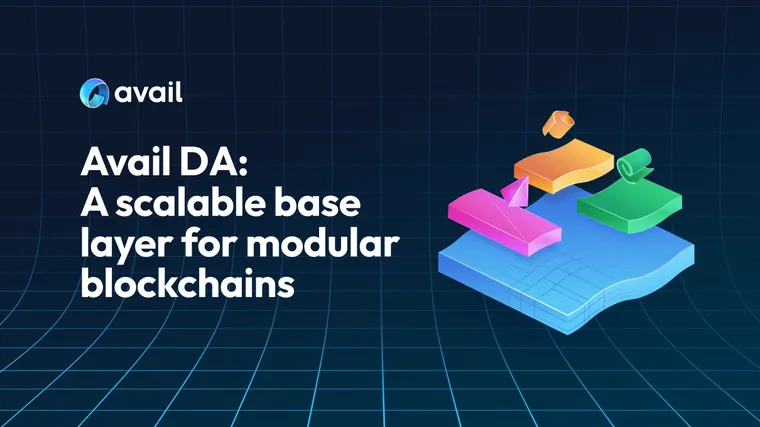Modular blockchains have significantly improved the ability for blockchains to scale, especially when compared with traditional monolithic designs. These benefits stem from separating the core operations of a blockchain into different layers, allowing greater specialization at each layer. This approach offers developers more flexibility to build for specific use cases by connecting optimized layers of the stack.
Avail provides a secure base layer that’s hyper focussed on data availability for the ecosystem to build on. This highly tuned base layer will provide raw blockspace for next-generation, trust minimized applications and blockchains.
From Monolithic to Modular - Evolution of Blockchain Technology
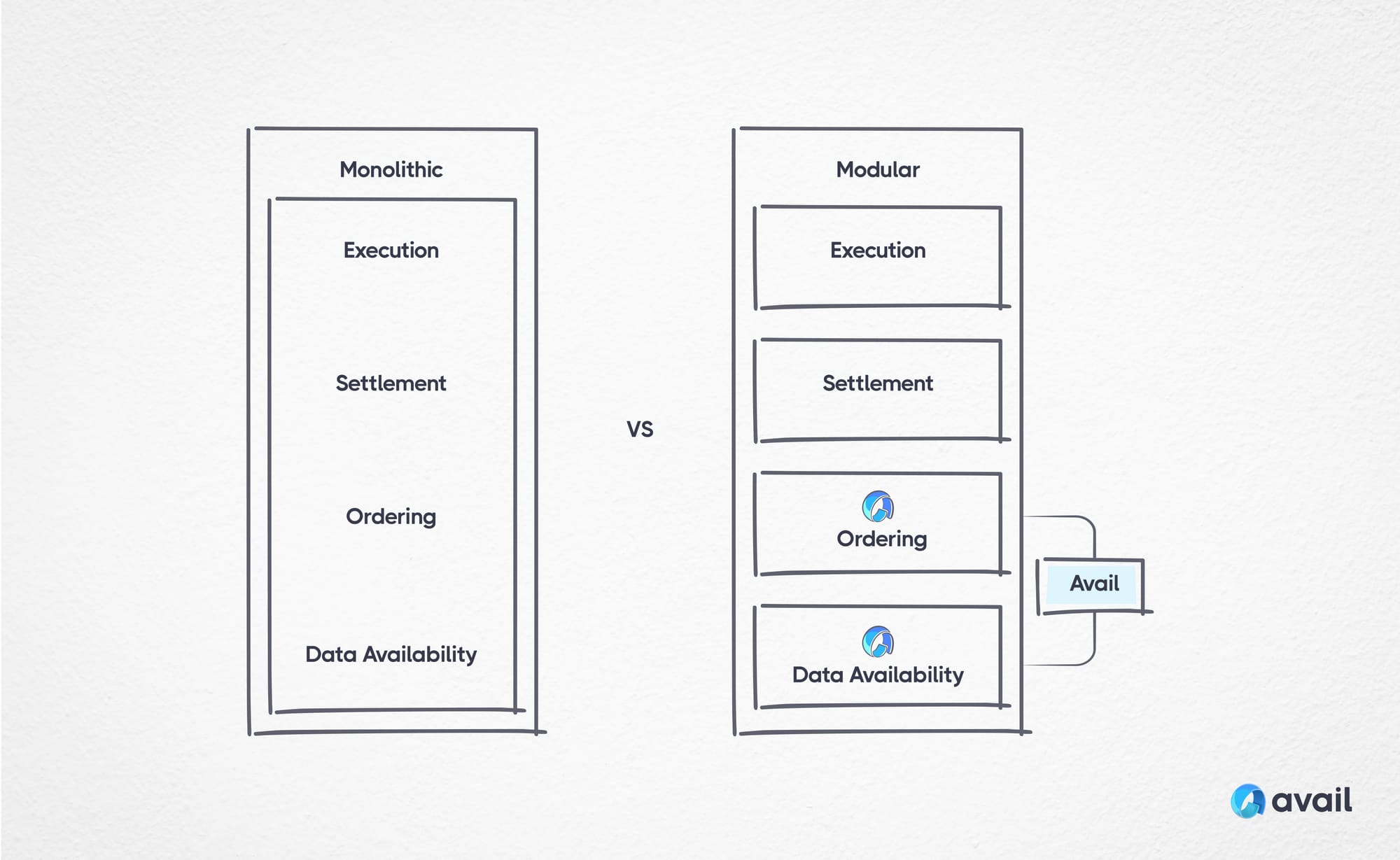
Dapps on Ethereum brought an explosion of creativity and attracted interest from a wider audience than the industry had ever seen. However, handling Execution, Settlement, Ordering and Data Availability on Ethereum’s monolithic chain led to scaling constraints as competition for the underlying computation increased. This led the industry to shine a spotlight on some of the underlying assumptions of a monolithic approach and begin experimenting with different solutions.
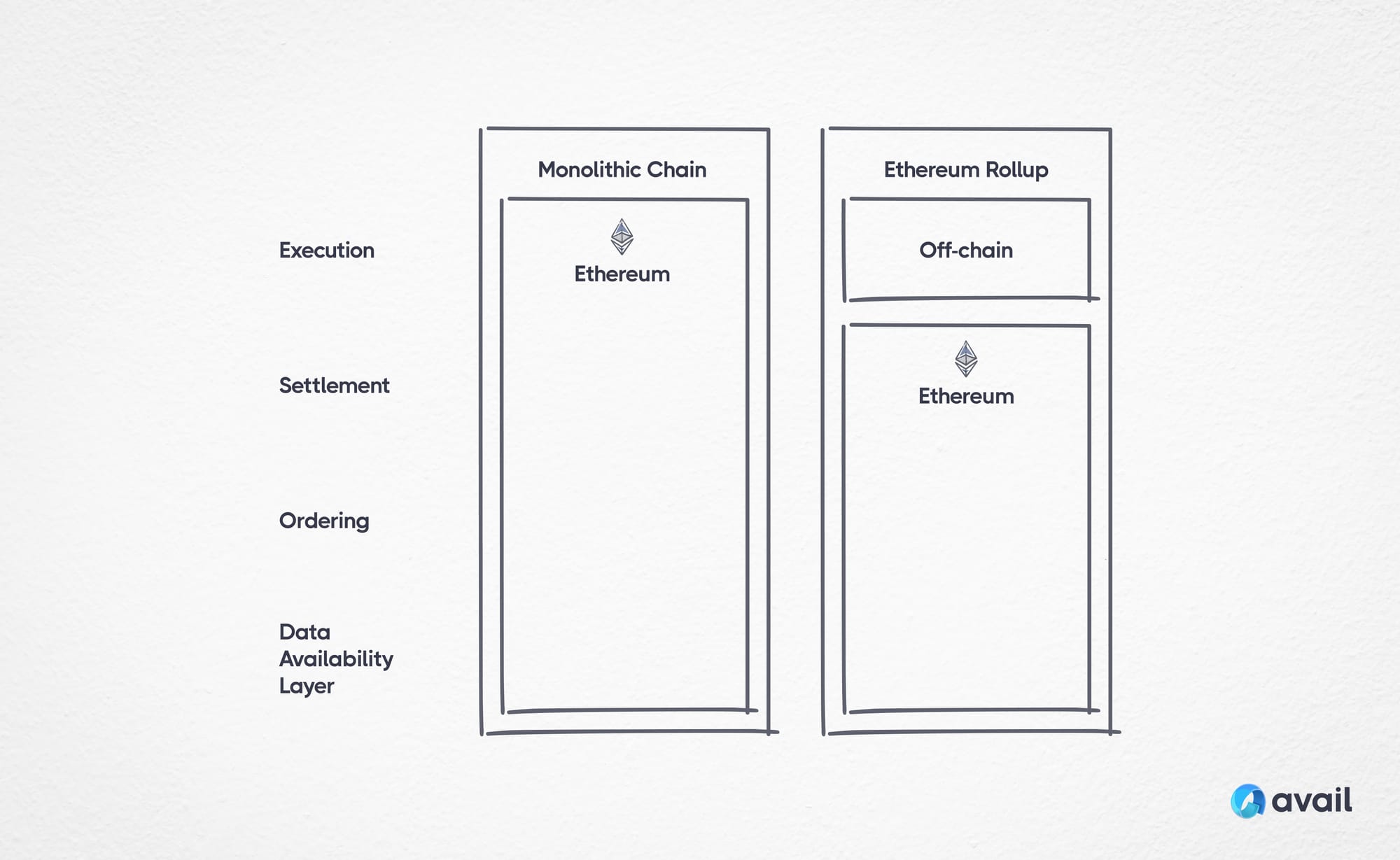
Rollups brought modularity to the industry by taking execution off-chain. As a result, they reduced congestion on the L1, lowered transaction costs for end users and increased the overall amount of transactions processed.
While these developments have resulted in meaningful improvements for the industry they have not removed the limited blockspace constraint which remains on Ethereum and is likely to resurface again with a major spike in demand. Apps continue using the L1 despite costs and Rollups still use the L1 to send data and handle settlement. The blockspace is more efficiently used now that Rollups handle execution off-chain but it remains a scarce resource.
In the same way that Ethereum Rollups were able to take execution off-chain, blockchains built with Avail DA can take data availability off-chain. Avail provides a flexible, easy to use and secure general purpose data availability layer for developers while addressing scalability, governance and decentralization concerns.
Modular Constructs Built with Avail
A rollup choosing to use Avail to publish transaction data off-chain turns into a Validium (or Optimium if it's an optimistic based rollup). Validiums and Sovereign Rollups can rely on Avail for trust-minimized data availability and ordering.
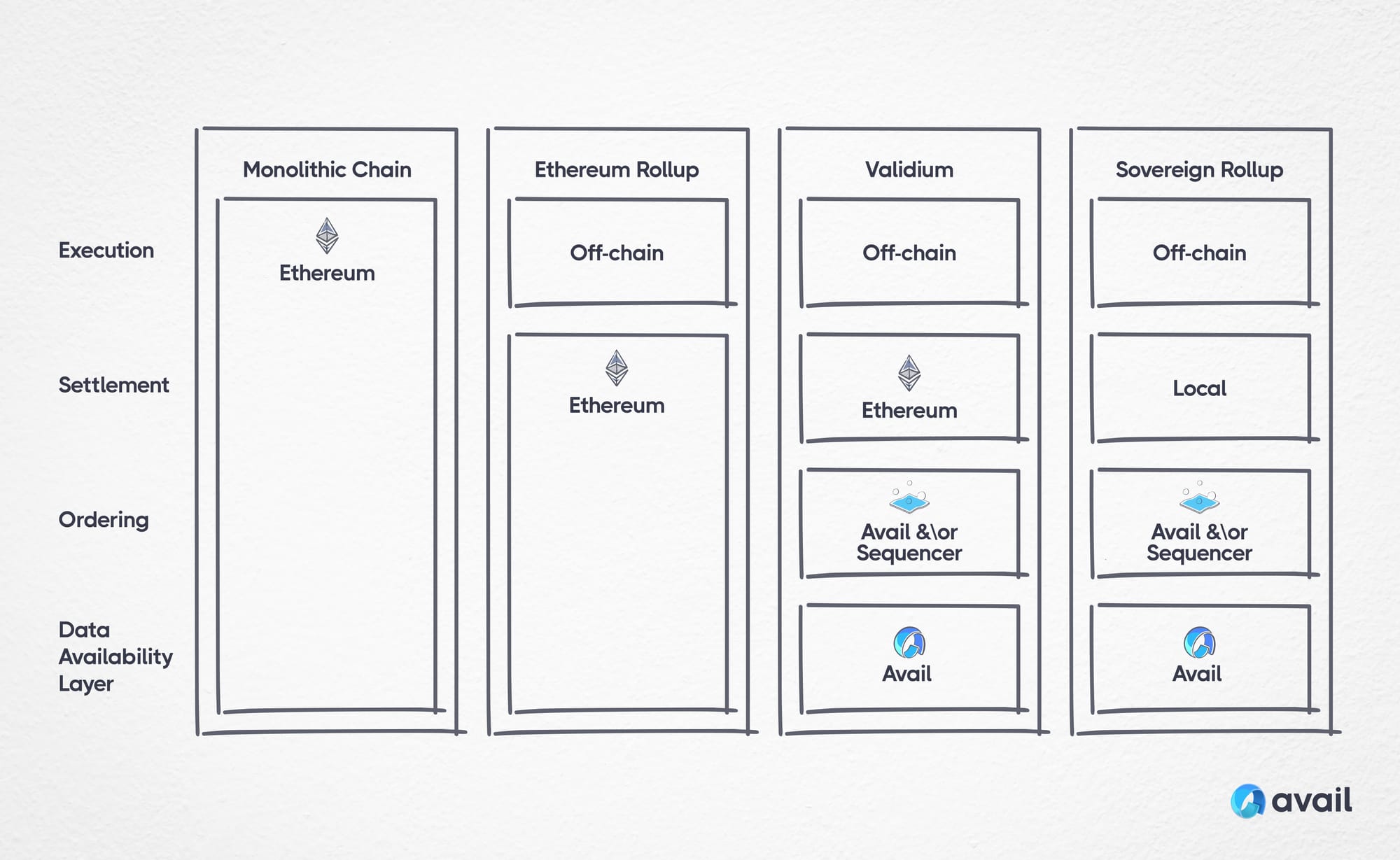
Let’s take a quick look at how Avail’s solution can help Validiums and Sovereign Rollups in the above examples.
- Avail would take in a data blob from a Validium or Sovereign Rollup against an application ID. This makes indexing data in Avail far simpler than a traditional L1 as all transaction data is tied to an App ID.
- Avail then extends the data blob through erasure coding to add redundancy to the data and make it harder for nodes to suppress data.
- Next, Avail commits the data through KZG polynomial commitments to ensure the data has a footprint in the Avail block header.
- Blocks are then proposed and distributed to a decentralized network of validators to reach consensus and commit the next block to the blockchain. Avail is building towards supporting up to 1,000 external validators in the active set to reduce validator centralisation risk.
- Because Avail uses validity proofs instead of fraud proofs, light clients can guarantee state correctness and data availability immediately after finalizing without waiting for a challenge period.
Avail’s light client network ensures high availability of data through Data Availability Sampling. Avail can ensure data is highly available by having light clients constantly sampling just a subset of the data. The light client can run on a user’s laptop or phone and as more light clients join the network, there’s more capacity for sampling which enables Avail to support bigger blocks.
In short, Avail’s solution ensures the modular blockchain ecosystem can access secure, affordable and highly available block space for transaction data unlocking significant scaling potential for the industry.
Validiums Built with Avail
To get around the Data Availability problem, some Validiums have established Data Availability Committees (DACs). But with Avail, DACs are no longer necessary. Validiums migrating to Avail can remove the centralization risk, governance and coordination overhead of a DAC by moving their Data Availability layer to Avail’s trust-minimized, public blockchain network.
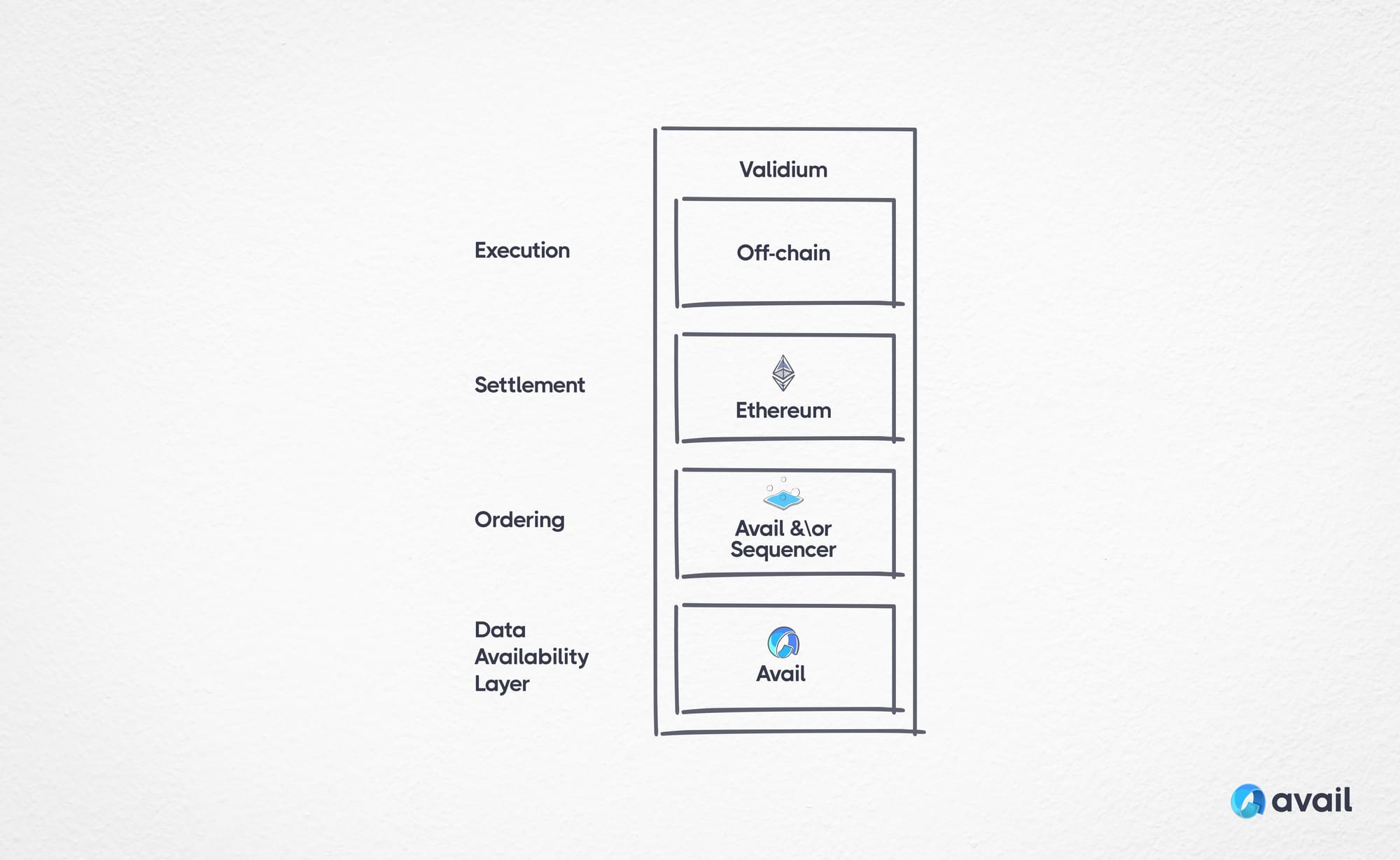
Validiums built with Avail can even send an attestation to Ethereum proving that Avail validators have reached consensus on the data's availability through Avail’s Data Attestation bridge. The Data Attestation Bridge is designed to plug into any EVM compatible chain and works for both ZK and optimistic implementations.
Those looking to explore the Validium construct on Avail in more detail might be interested in this zkEVM Validium.
Sovereign Rollups Built with Avail
Sovereign Rollups are a unique design which take the modular framework a step further. They move transaction settlement and finalization away from smart contracts on the base layer. Instead, every node within the Sovereign Rollup’s network can leverage Avail’s base layer to verify the chain's state independently.
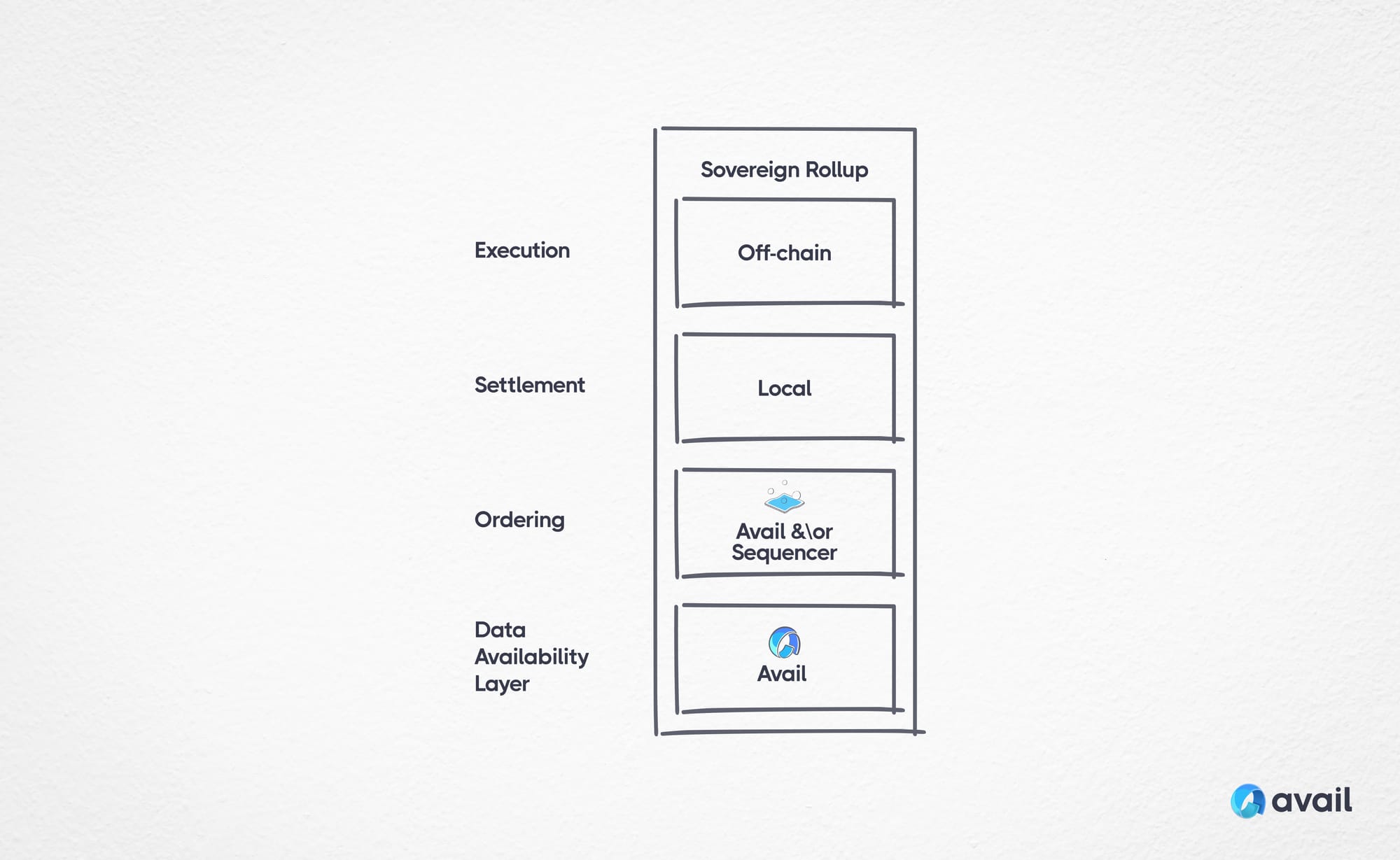
Shifting verification and settlement from smart contracts on the base layer to a peer-to-peer network gives users greater control and autonomy. Instead of the fork choice rule being embedded in a smart contract on the L1, it moves to the Sovereign Rollup users themselves. Network nodes can then determine the canonical chain through fraud proofs or ZK proofs.
Another benefit of building a Sovereign Rollup on Avail is that developers don’t need to recruit a validator set because they inherit security from validators on Avail’s base layer. As a result, developers begin to unlock beneficial aspects of web2 development such as greater experimentation and quicker iterations without compromising on security.
Those interested in building a Sovereign Rollup construct with Avail should check out Sovereign Lab’s SDK with Avail’s DA Adapter. You can also take a look at OpEVM which can be used to build Sovereign, EVM-compatible Optimistic Rollups. Please be aware these are not production ready.
Sovereign Rollups have emerged as a promising construct within the modular ecosystem with many design spaces yet to be explored. Avail’s un-opinionated, general purpose base layer provides ample room for experimentation and is likely to play an important role in scaling trustless computing.
A Dedicated Data Availability Layer for the Modular Blockchain Ecosystem
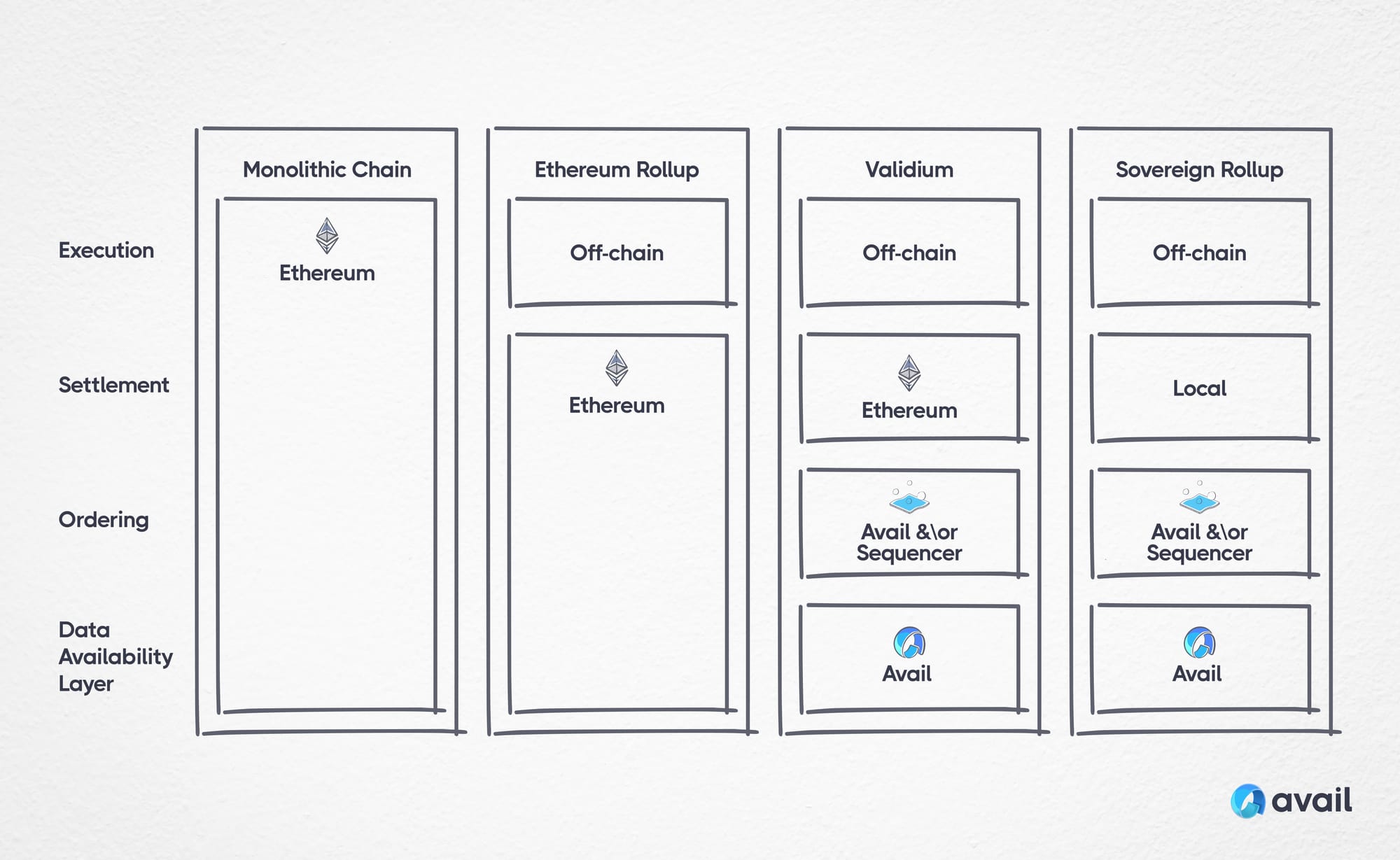
As we build towards mainnet release the Avail team is forming partnerships with L2s, L3s, Sovereign Rollups, tooling providers and others looking to build on Avail’s dedicated Data Availability layer. If you're looking to enhance your project and interested in integrating with Avail, email us at info@availproject.org.
We invite the community to follow us as we continue chipping away at this major blockchain scaling milestone and collectively work towards building open, permissionless blockchain networks with the community.
You can learn more about Avail’s solution in our docs or on github.
About Avail
Avail is led by Polygon’s former co-founder Anurag Arjun and is building a unification layer to solve rollup fragmentation at scale. Avail addresses this from first principles solving blockchain scalability with Avail DA, a foundational DA layer which implements the same technology planned for Ethereum’s danksharding roadmap, including KZG Commitments and Data Availability Sampling (DAS). Avail Nexus addresses growing fragmentation concerns with permissionless interoperability, leveraging proof aggregation on Avail’s scalable DA layer. Avail’s security is then reinforced with multi-asset staking through Avail Fusion. Start your unification journey today at availproject.org

